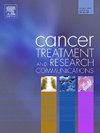Real-world clinical practice and outcomes in Peruvian patients with advanced EGFR T790M mutation positive NSCLC: A multicenter analysis
Q3 Medicine
引用次数: 0
Abstract
Introduction
Despite osimertinib being the standard therapy for advanced EGFR T790M mutation positive NSCLC, in many Latin American countries, access to molecular testing and targeted therapies is limited, directly impacting patient outcomes. This study describes the real-world management and outcomes of Peruvian patients with advanced EGFR-mutated NSCLC who develop the T790M mutation.
Methods
We conducted a multicenter retrospective study including patients from nine Peruvian institutions, both public and private, who progressed to first-line EGFR TKI and developed T790M mutation, detected between January 2018 and December 2023. We evaluated demographic, clinico-pathological features and treatment data, including diagnostic pathway, treatment patterns, and survival outcomes.
Results
Seventy-eight patients were included; T790M was detected by liquid biopsy in 52.6 % of cases. Median time from progression to T790M detection was 59.5 days (7–244). Osimertinib was administered to 62.8 % of patients after detection, with a median initiation time of 42 days (1–104). Median overall survival (OS) from first-line treatment was 46.6 months for patients who received osimertinib, 23.9 months for those receiving other therapies, and 16.1 months for those without treatment (p = 0.001). Among osimertinib-treated patients, the objective response rate (ORR) was 59.2 %, with a median progression-free survival (PFS) of 15.8 months. Median OS from osimertinib initiation was 16.3 months, significantly longer than for patients receiving other treatments after T790M detection (9.7 months; p = 0.002).
Conclusions
This study confirms the real-world effectiveness of osimertinib in Peruvian patients with advanced EGFR T790M positive NSCLC and highlights the importance of timely detection and access to targeted therapies.
秘鲁晚期EGFR T790M突变阳性NSCLC患者的临床实践和结果:一项多中心分析
导言尽管奥希替尼是晚期表皮生长因子受体(EGFR)T790M突变阳性NSCLC的标准疗法,但在许多拉美国家,分子检测和靶向疗法的可及性有限,直接影响了患者的治疗效果。本研究描述了秘鲁晚期EGFR突变NSCLC患者发生T790M突变后的实际管理和预后情况。方法我们开展了一项多中心回顾性研究,包括来自秘鲁9家公立和私立医疗机构的患者,这些患者在2018年1月至2023年12月期间检测到一线EGFR TKI治疗进展并发生T790M突变。我们评估了人口统计学、临床病理学特征和治疗数据,包括诊断途径、治疗模式和生存结果。结果共纳入 78 例患者;52.6% 的病例通过液体活检检测到 T790M。从病情恶化到检测到T790M的中位时间为59.5天(7-244天)。62.8%的患者在检测出T790M后接受了奥希替尼治疗,中位起始时间为42天(1-104)。接受奥希替尼一线治疗的患者的中位总生存期(OS)为46.6个月,接受其他疗法的患者为23.9个月,未接受治疗的患者为16.1个月(P = 0.001)。在接受奥希替尼治疗的患者中,客观反应率(ORR)为59.2%,中位无进展生存期(PFS)为15.8个月。结论这项研究证实了奥希替尼在秘鲁晚期表皮生长因子受体 T790M 阳性 NSCLC 患者中的实际疗效,并强调了及时发现和获得靶向治疗的重要性。
本文章由计算机程序翻译,如有差异,请以英文原文为准。
求助全文
约1分钟内获得全文
求助全文
来源期刊

Cancer treatment and research communications
Medicine-Oncology
CiteScore
4.30
自引率
0.00%
发文量
148
审稿时长
56 days
期刊介绍:
Cancer Treatment and Research Communications is an international peer-reviewed publication dedicated to providing comprehensive basic, translational, and clinical oncology research. The journal is devoted to articles on detection, diagnosis, prevention, policy, and treatment of cancer and provides a global forum for the nurturing and development of future generations of oncology scientists. Cancer Treatment and Research Communications publishes comprehensive reviews and original studies describing various aspects of basic through clinical research of all tumor types. The journal also accepts clinical studies in oncology, with an emphasis on prospective early phase clinical trials. Specific areas of interest include basic, translational, and clinical research and mechanistic approaches; cancer biology; molecular carcinogenesis; genetics and genomics; stem cell and developmental biology; immunology; molecular and cellular oncology; systems biology; drug sensitivity and resistance; gene and antisense therapy; pathology, markers, and prognostic indicators; chemoprevention strategies; multimodality therapy; cancer policy; and integration of various approaches. Our mission is to be the premier source of relevant information through promoting excellence in research and facilitating the timely translation of that science to health care and clinical practice.
 求助内容:
求助内容: 应助结果提醒方式:
应助结果提醒方式:


